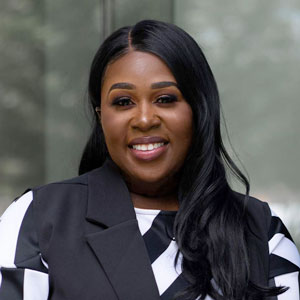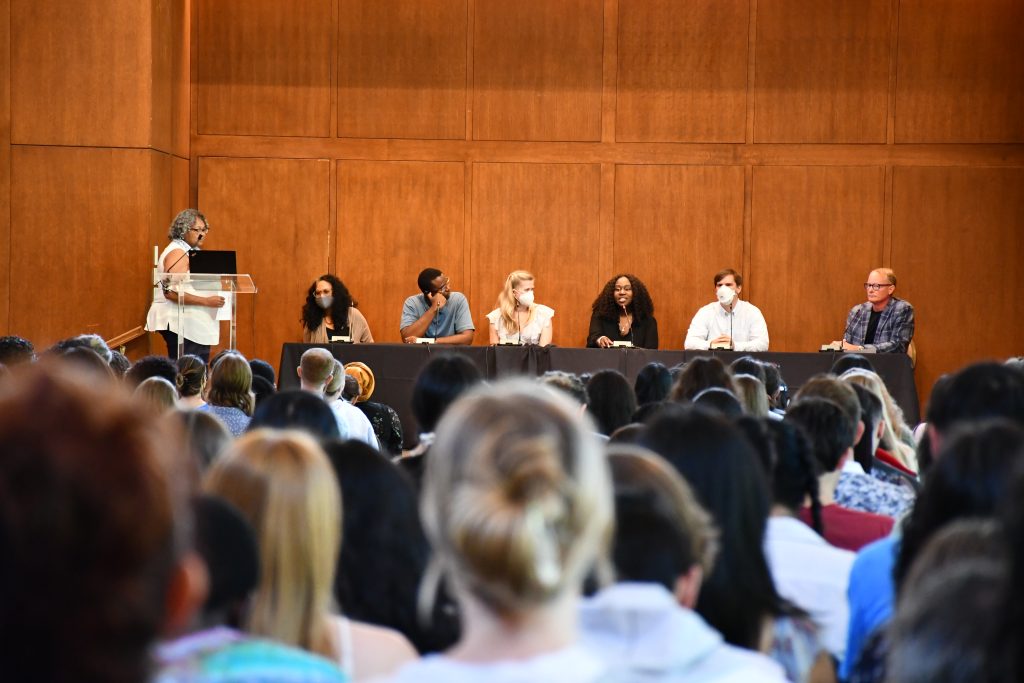The following article was originally published by the Center for Family Research, Owens Institute for Behavioral Research at the University of Georgia and is being reprinted with permission.
How can we prevent life-altering, substance addictions?

It is the guiding question in the research and intervention work of Trenette Goings, professor of social work at the University of North Carolina at Chapel Hill. Her multi-year effort at understanding the factors that contribute to substance misuse and those that prevent it, especially in Black communities, is both an academic and a personal quest.
“I have family members who I never met because of addiction,” she says. “So for me, it’s very personal.”
Growing up, her father warned her that substance use “can take you further than you want to go.” Between those warnings and what she saw in the lives of many around her, she stayed far away from it herself, but helping to prevent substance use is now a driving force in her life.
The roots of a professional and personal mission
Growing up, Goings’ world was a small one. Her tiny, rural town in northeastern North Carolina offered few glimpses of life outside the small-town culture—something that possibly led to some of the substance use and abuse she witnessed—as well as few opportunities for positive activities outside of those connected to school or church. When some North Carolinians hear she is from there, “they can’t believe I’ve made it this far,” she says.
In school, she participated in practically everything available to her: softball, volleyball, basketball, band, JROTC, Beta Club, and somehow, even with few models in her life for higher education, she saw herself on that path. In her junior year she wrote in a class reflection paper, “that I would get a PhD and become a professor,” she recalls. She vaguely remembers the idea came from wanting to inspire young people (her current lab, perhaps not coincidentally, is called the INSPIRED Lab).
The lofty goal may also have something to do with what she learned at home. Her mother worked in home health, and her father was a model of the hard-working, goal-setting provider who sacrificed to provide for the family.
He worked a well-paying job in shipbuilding. Getting up at 4:30 in the morning to make the trip to Newport News, Virginia, a one-and-a-half-hour drive away, he would return home sweaty and exhausted. Then work part-time selling cars, handling his landlord responsibilities, or at their church in the evenings only to do it all again the next day.
What she witnessed in her father seems to have spawned in her the drive to get ahead. “I think I get my work ethic from him,” Goings says. When she was 14, she started a cleaning business with a friend to make extra money. “She didn’t have to work,” her father explains. “She wanted to do it.”
Despite her drive, she did not fully excel as a student until college. “Once she got in college, it shifted,” her father says. “She really locked in on the seriousness of a good education,” and no doubt, what it could do for her.
Without a clear plan or even an area of interest, her journey specifically into social work and prevention research began somewhat randomly. While considering what college to go to and what to major in, she noticed a one-page flyer on the hallway wall of her high school with a list of majors and a short description of each.
‘’When I saw the mission of social work and I thought about some family members and how it played a role in keeping them safe,” she says, “I decided to major in social work.”
It was the right choice, it appears, because her teaching and scholarship have been well regarded. As the Sandra Reeves Spears and John B. Turner Distinguished Professor of Social Work at UNC, Goings has received numerous awards, including an R01 research grant from the National Institutes of Health, one of the most highly competitive federal awards that is generally designated for leading research scholars across the country. Most recently, she was invited to serve as a standing member on an NIH scientific review panel, a highly selective appointment and a significant honor given that only 3.2% of all NIH reviewers are Black and even fewer are social workers.
Mentoring was key
Starting with that random flyer in her high school hallway which led her to social work, Goings seems to have learned how to find the help and guidance she needed to navigate the academic world that was new to her. “I didn’t have mentors that were in my natural networks,” she explains.
So besides the work ethic she learned from her parents and her scholarly talent, it was the guidance from others that appears to have helped this small-town girl make it in the big leagues of academia.
After arriving at Virginia Commonwealth University for her doctoral work and knowing she wanted to focus on addiction prevention, she looked for a faculty mentor with expertise in prevention science. She had to go outside her social work program to find the right fit. Psychology professor Faye Belgrave agreed to take her on because “she was very persistent, number one,” she explains. “She also had a clear vision of what she wanted.”
Though she was initially resistant to take on a student outside her department, it turned out to be “one of the best decisions I’ve made in life,” Belgrave adds. The two became close and have worked on papers and a book together.
In her work with other minority or underrepresented students, Belgrave often uses Goings as an exemplar.
At UNC in her first research and teaching position—the first and only tenure-track position she applied for—she found herself surrounded by faculty who offered guidance. “I was blown away by the mentorship,” she says.
And when she got really focused on her research, she looked for wisdom again. “I didn’t just wait for them to come find me,” she says. This time, among others, mentorship came from Gene Brody at the Center for Family Research at UGA.
“He does what I had hoped to do,” she says about his work studying mostly rural, Black families. She was pleasantly surprised at his willingness to mentor her, sometimes having long phone calls in which, she says, he paced back and forth exploring ideas and offering suggestions.
Brody offered her an official slot as a mentee on a CFR grant, and through the experience, “he gave me time,” she says of his support. Writing a couple of papers together and working to hone a hypothesis about biracial youth, “she took the bull by the horns,” Brody says, “and turned it into an NIH proposal which got funded.” Impressed by her focus and drive, Brody adds that “she has, and will, do great things.”

The research agenda
Goings’ research is both applied and more theoretical. In her NIH R01 study, she is testing her “double jeopardy hypothesis model,” developed with the support of Brody, which posits that biracial youth deal with additional stressors in life that others do not because some experience rejection, or lack of complete acceptance, by both their racialized groups. Her work is investigating the idea that these unique stressors are what put these youth at their observed higher risk of substance use.
Her other work is more applied. Funded by the Substance Abuse and Mental Health Services Administration, this work is testing the effectiveness of substance use prevention programs for both youth and parents. Students attending middle schools and youth-serving community programs in two urban and rural North Carolina counties are receiving Botvin LifeSkills Training while two additional rural and urban counties are getting a mindfulness intervention.
The project is also testing the effectiveness of the Triple P parenting program with parents. Though results are very preliminary, she has been surprised to find that the intervention seems to be having a stronger effect on parents’ mental health than parenting skills. Speculating that it has something to do with the social support of the program, she says that parents are reporting less anxiety and depressive symptoms by the end of intervention.
Working closely with schools and agencies in the communities where her research is conducted, she hopes to not only learn better what works but also truly benefit the communities participating. “It’s not about the articles or books for me,” she says. “I’m here because I care about the community and want to help promote positive outcomes for children and families.”
Having an impact
Having a real effect on the world she saw growing up is what drives her hard work in scholarship, teaching, and community work even while managing a family with two young children. “It really is about impact,” she says.
Whether this “I can do it” attitude is genetic or learned is unclear, but certainly, it is prevalent in the family. After understanding that her mother had written a book (African American Families), Goings’ five-year-old daughter started writing 3 or 4 page books on her own after school, and then announced one day that she wanted to write a real book.
Thinking it was cute and being supportive, Goings said, “OK, you can write a little book.” But her daughter replied, “no, I mean a real book.” And she did. The book is a collection of self-affirmations that she tells herself when she is about to do something difficult like, “I can do hard things,” and “I will make a difference in our world.”
Like mother, like daughter.

